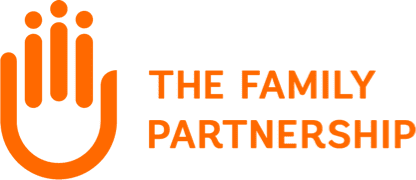At The Family Partnership, we believe in generational healing and wellbeing—and this starts with experienced and strategic leadership. We are excited to announce that we have launched a search for our next President & CEO, in partnership with CohenTaylor Executive Search Services.
The President & CEO will be responsible for advancing The Family Partnership’s mission and vision while providing strategic leadership across the organization’s operations, including administration, finance, and programs. As the primary representative of TFP, this leader will cultivate and strengthen meaningful partnerships with key stakeholders to drive impact and innovation.
The ideal candidate will be a dynamic and relationship-centered leader with a track record of guiding complex teams and fostering a strong organizational culture. Experience in health and human services—particularly in behavioral health, early childhood, youth, and family support—is highly valued.
Location: Minneapolis, MN
Salary Range: $172,000 to $180,000.
Learn more about the position and apply here:
About The Family Partnership
For more than 147 years, TFP has successfully partnered with families and individuals to remove barriers and clear the path to success for those who have experienced deep poverty and trauma. We strive to be a leader in closing opportunity and achievement gaps for children and families living in poverty by providing high-impact, multicultural services, building powerful partnerships, and changing public policy.
Our holistic services and offerings include:
- Early Childhood Education and Care
- Mental Health Therapies
- Family Home Visiting
- Anti-Sex Trafficking
- EGG Toolkit
TFP’s use of a comprehensive multi-gen approach based on our established two-generation (2Gen) framework puts us at the forefront of breaking intergenerational cycles of poverty, adversity, and trauma. This whole family approach to our services promotes child and family health and well-being across generations to increase economic security, educational success, and overall healthy development.
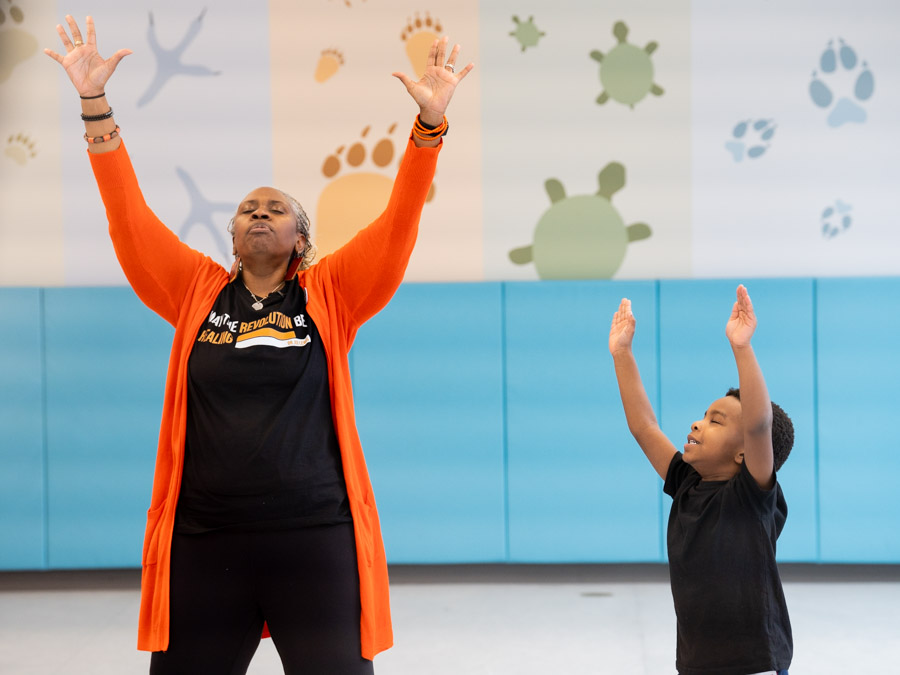
executive function and self-regulation skills at the stage when brain development is at its fastest and most foundational.
Key milestones from 2024 include:
- 100% of children graduating from Four Directions Preschool tested at or above the age-adjusted national median for executive functioning, the overall best predictor of success in school and life. This number includes 51% of children who utilized onsite developmental therapies
- 100% of parents and caregivers enrolled in Parenting for the Future, one of our family home visiting programs, improved their knowledge of childcare and parenting skills
- 94% of clients in outpatient mental health services made progress as determined by their treatment plans
- 85% of clients in our anti-sex trafficking program maintained or increased safety
- Preschool teachers using EGG Toolkit, The Family Partnership’s early childhood executive function curriculum, saw a statistically significant improvement in child behavior after one school year
Minnesota’s recent investments in early childhood have helped thousands of Minneapolis families living in or near poverty achieve significant milestones through The Family Partnership’s programs in 2024:
- 90% of children in our preschools graduated kindergarten-ready, nearly doubling the 52% rate of their peers
- 87% of children in developmental therapies met their treatment goals
Parents like Amanda Youlou have directly benefitted from these investments. She used and early learning scholarship to enroll her daughter, Lilah, at TFP’s top-rated Four Directions Preschool. Through play-based learning, healthy nutrition and nurturing care from her teachers, Lilah thrived. She also accessed onsite play-based therapy to help her cope with the death of her father.
“Lilah developed a love of learning at Four Directions,” shares Amanda. Today, Lilah is thriving in second grade, and Amanda credits The Family Partnership with helping her daughter build the confidence and emotional resilience she needed to succeed.
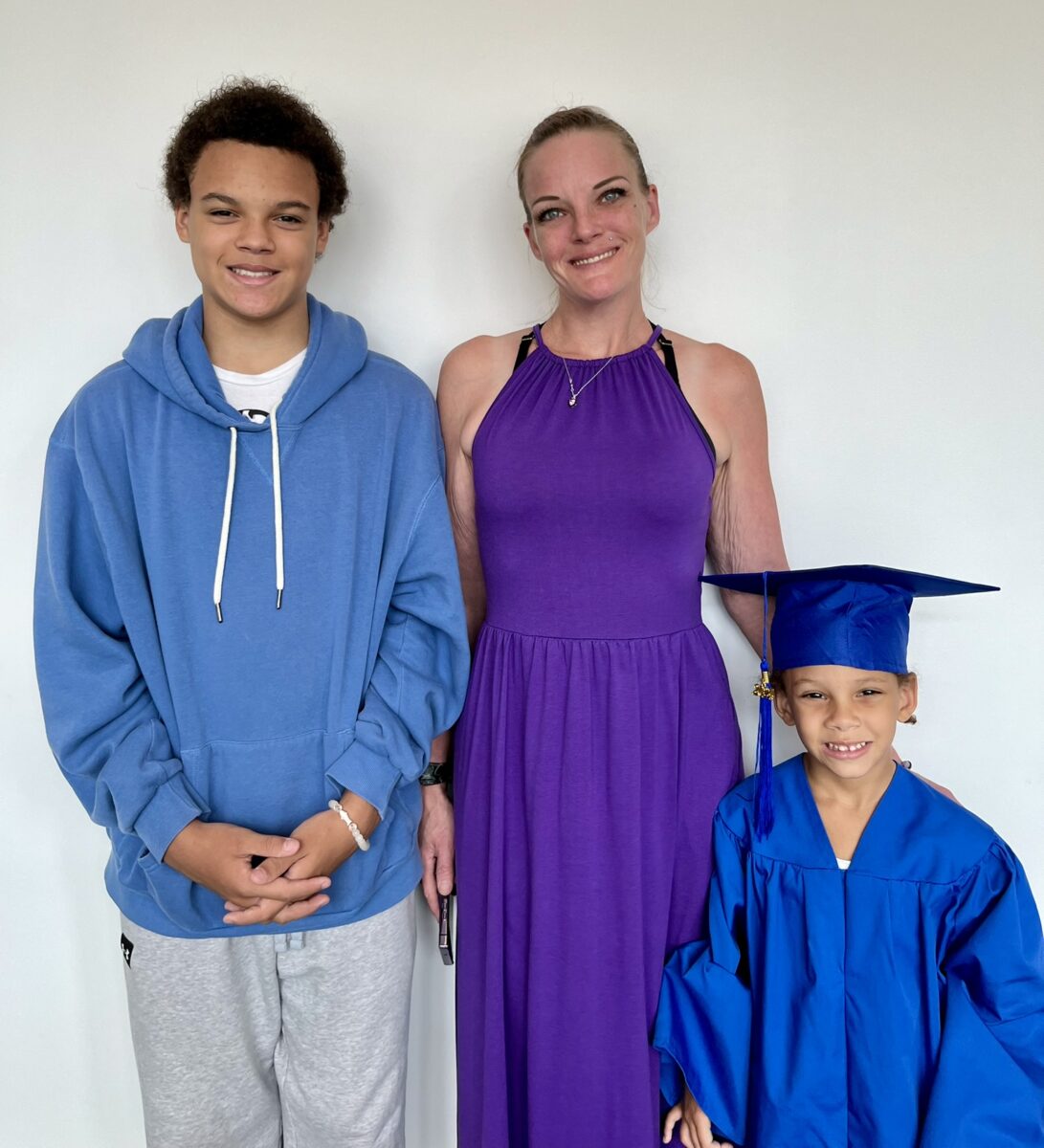
Research shows that children like Lilah who receive high-quality early childhood education experience positive outcomes in cognitive development. This is especially true for executive function skills that predict children’s academic achievements in K-12 education and, later, success in the workforce.
Early Childhood Investments in 2023 Fuel Minnesota’s Economy and Families, Highlighting the Need for Increased Funding in 2025
High-quality early childhood programs like Four Directions make it possible for parents and caregivers to participate fully in the workforce. “Without good childcare, you can’t get to work,” Amanda explained, “or you might have leave your kids with people you don’t know well.”
Without good childcare, you can’t get to work or you might have to leave your kids with people you don’t know well.
Amanda Youlou, parent
Workforce participation and affordable child care go hand in hand, especially for low-income families who otherwise spend an average of 36% of their income on child care. Studies show when child care costs are subsidized, parents and caregivers from low-income households are much likelier to remain employed, especially in full-time jobs.
In 2023 the Minnesota Legislature made historic investments in our state’s families and future by investing $1.3 billion over four years to early childhood education and care—one of the boldest commitments in the nation. These funds expanded access to high-quality child care and early learning programs, with key actions including:
- More funding to help families afford preschool and high-quality child care through Early Learning Scholarships (ELS)
- Expanded access to the Child Care Assistance Program (CCAP) that helps cover child care costs for more families
- Simplified application process to make it easier for families to qualify for financial support
- Increased payments to child care providers so they can keep offering quality care for families
While these steps made a difference, they do not fully address the needs of thousands of working families still struggling to find affordable, high-quality child care. Legislators from both sides of the aisle, including Rep. Nolan West (R-Blaine) and Rep. Carlie Kotyza-Witthuhn (DFL-Eden Prairie), are currently proposing legislation to expand Early Learning Scholarships to more families in need.
Child Care Shortages Cost Minnesota Families and the Economy Billions Each Year
It is important to sustain early childhood investments in 2025 including early learning scholarships. The demand for affordable, high-quality child care is rising as more workers return to the office. At the same time, every region in Minnesota is grappling with significant child care shortages that limit families’ options.
In 2024, first Children’s Finance estimated these shortages affected 89,528 Minnesotan children with working parents. Without better options, many parents stay home or reduce their work to part-time in order to care for their children. Some parents alternate working hours with their partners or other family members, missing out on important family bonding time.
The cost of insufficient child care in Minnesota affects families as well as businesses and taxpayers. Research shows these negative impacts total $2.1 billion in losses per year in Minnesota including:
- $19,610 average loss for parents in earnings and productivity each year
- $3,280 loss in revenue for businesses, per working parent
- $5,170 loss for taxpayers due to lower income tax and sales revenue, per working parent
These monetary losses have long-term consequences for children, especially those living in low-income households. Economic instability increases risks that children will experience hunger, homelessness or child maltreatment. In fact, poverty has the same harmful impacts as other Adverse Childhood Experiences (ACEs) like physical abuse or neglect. There are lifelong ramifications for children who grow up with toxic stress related to economic instability, including higher risks of depression, substance abuse and unemployment in adulthood.
Early childhood investments are some of the most strategic moves Minnesota can make for our short-term and long-term prosperity.
Early childhood investments are some of the most strategic moves Minnesota can make for our short-term and long-term prosperity. We’ll support this generation’s working parents while building a strong workforce for the next. These investments will continue to position Minnesota as one of the nation’s best places to raise a family and strengthen our economic growth.
Take Action: Advocate for Expanded Early Childhood Funding in 2025
Join The Family Partnership in raising awareness and support for early childhood investments. Here are just a few ways you can help:
- Join The Family Partnership this Thursday, 2/20/25 for Advocacy for Children Day at the capitol and make your voice heard
- Contact your legislators and encourage them to support funding (HF 470/SF 1049) for early childhood education.
- Sign up for our newsletter to stay informed about our advocacy efforts
The Family Partnership is working with the Minnesota Department of Revenue to make sure individuals and families who qualify for new tax credits can access free tax preparation.
Even if you do not have to file a Minnesota income tax return, you can still file to get tax benefits. There are five new Minnesota tax credits you may be able to claim that may help you pay less taxes and get a bigger refund. Let a professional preparer help you claim what you’re eligible for!
Who is Eligible for Free Tax Preparation?
Generally, you can get free help preparing your taxes if:
- You are age 60 or older
- You are a person with a disability
- You speak limited or no English
- Your annual income is less than $67,000
If any of the above statements are true for you, visit the Minnesota Department of Revenue to search for a free Tax Preparation Site. The sooner you find a tax preparation site, the better. Spaces can fill up weeks before Tax Day on April 15, 2025.
How Do I Find a Free Tax Preparation Site?
You can use the Minnesota Department of Revenue’s free tax preparation site tool to find sites.
- You can search by zip code or county
- You can use the Language menu to find sites with help in Spanish, Hmong, Somali, or other languages
All sites only prepare basic returns. Learn more about the services offered at free tax preparation sites by visiting this IRS webpage.
What Do I Need to Provide?
You should bring a picture ID and other personal information to your appointment.
- A government-issued photo ID
- Social Security cards or Individual Tax Identification Numbers for all listed on the tax return
- Birthdates for all listed on the tax return
You should also bring records showing income you received, tax-deductible expenses, and property tax or rental payments you made.
To learn more details about which records to bring, visit the Minnesota Department of Revenue.
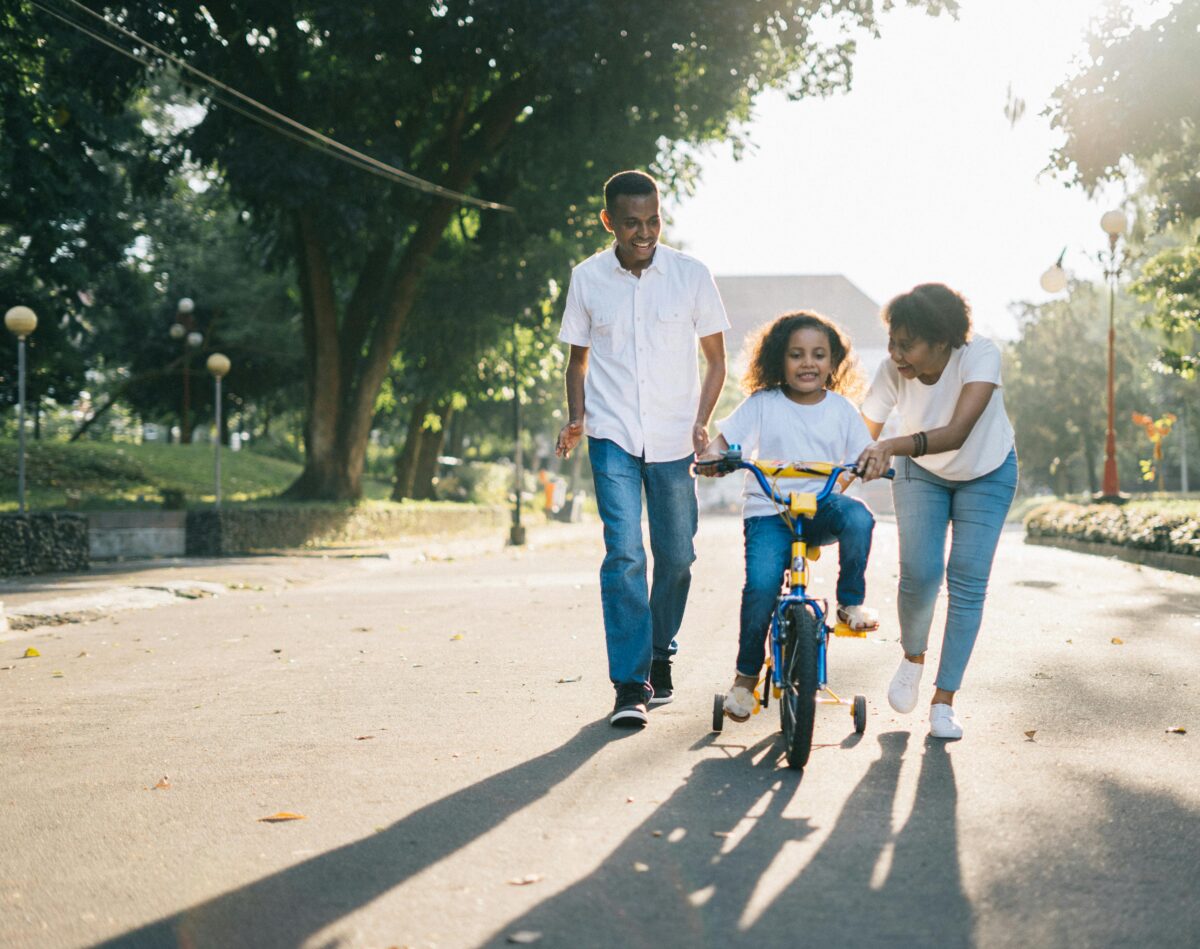
Where Do I Learn about Minnesota’s Newest Tax Credits?
You can learn more about the following tax credits on our Minnesota Tax Credits page:
- Minnesota Child Tax Credit
- Working Family Credit
- K-12 Education Credits
- Property Tax Refunds for Homeowners
- Property Tax Refunds for Renters
You can also reach out to the Minnesota Department of Revenue for more information and help:
Minnesota Department of Revenue
Phone: 651-296-3781 or 1-800-652-9094
Website: Minnesota Department of Revenue
This service made available through a grant provided by the state of Minnesota.
The Family Partnership (TFP) is excited to welcome Julie Bluhm as our new Interim President & CEO. Julie brings expertise in guiding nonprofit organizations through transitions and aligning mission-driven work with sound business practices. Her leadership will guide TFP through the search for a permanent CEO and help us to continue building a strong foundation for the future.
Julie shared her enthusiasm and vision for her work with TFP:
“My goal during this interim period is to help connect the dots between The Family Partnership’s strengths and align this organization for the best outcomes. By the time TFP’s new leader arrives, we will be ready for the next chapter, and staff will feel rested, calm, fulfilled and excited about the future.”
My goal during this interim period is to help connect the dots between The Family Partnership’s strengths and align this organization for the best outcomes.
Julie Bluhm, Interim President & CEO
Introducing our Bridge Strategic Framework
In tandem with this leadership transition, TFP’s Board of Directors has adopted a Bridge Strategic Framework for 2025-2026. This forward-looking plan outlines five priority areas to guide TFP’s mission of building strong families, vital communities, and brighter futures for children.

Financial Sustainability
TFP is committed to ensuring its 146-year legacy of serving families and children experiencing intergenerational trauma, poverty, and adversity. Through flexible funding strategies, new revenue streams, innovative partnerships, and operational efficiencies, TFP will remain resilient and impactful amid an evolving financial landscape.
Organizational Health and Resilience
Recognizing the critical role of staff and board members in sustaining its mission, TFP will prioritize enhancing internal systems, supporting staff well-being, and strengthening board governance to navigate change with creativity and flexibility.
Intergenerational Impact through Services
Using a two-generation (2Gen) approach, TFP will continue to break cycles of poverty, adversity, and trauma by integrating services for both children and caregivers. Grounded in evidence-based practices, this approach addresses systemic racism and other barriers to create sustainable outcomes for families.
Thought and Practice Leadership
TFP remains committed to service delivery innovation and collaboration with local and national partners to drive improved outcomes for children and families.
Equity, Inclusion, and Anti-Racism
Dedicated to equity and inclusion, TFP will apply best practices in anti-racism within its operations and services while fostering leadership development across its staff and board.
Interim Leadership Builds a Strong Foundation for our Future
The Bridge Strategic Framework complements Julie Bluhm’s interim leadership by providing a clear and actionable roadmap for advancing TFP’s mission. Julie’s leadership philosophy is deeply rooted in helping organizations thrive during times of change:
“I’m really passionate about helping organizations connect their strengths and prepare for new leadership. If we do this well, we can ensure that the next leader’s skills, interests, and passions align perfectly with TFP’s needs.”
Julie’s prior experience includes serving as CEO of Guild Services, where she succeeded the organization’s founder. This experience gave her unique insights into the complexities of leadership transitions, inspiring her to help organize a support group for executive directors navigating similar journeys.
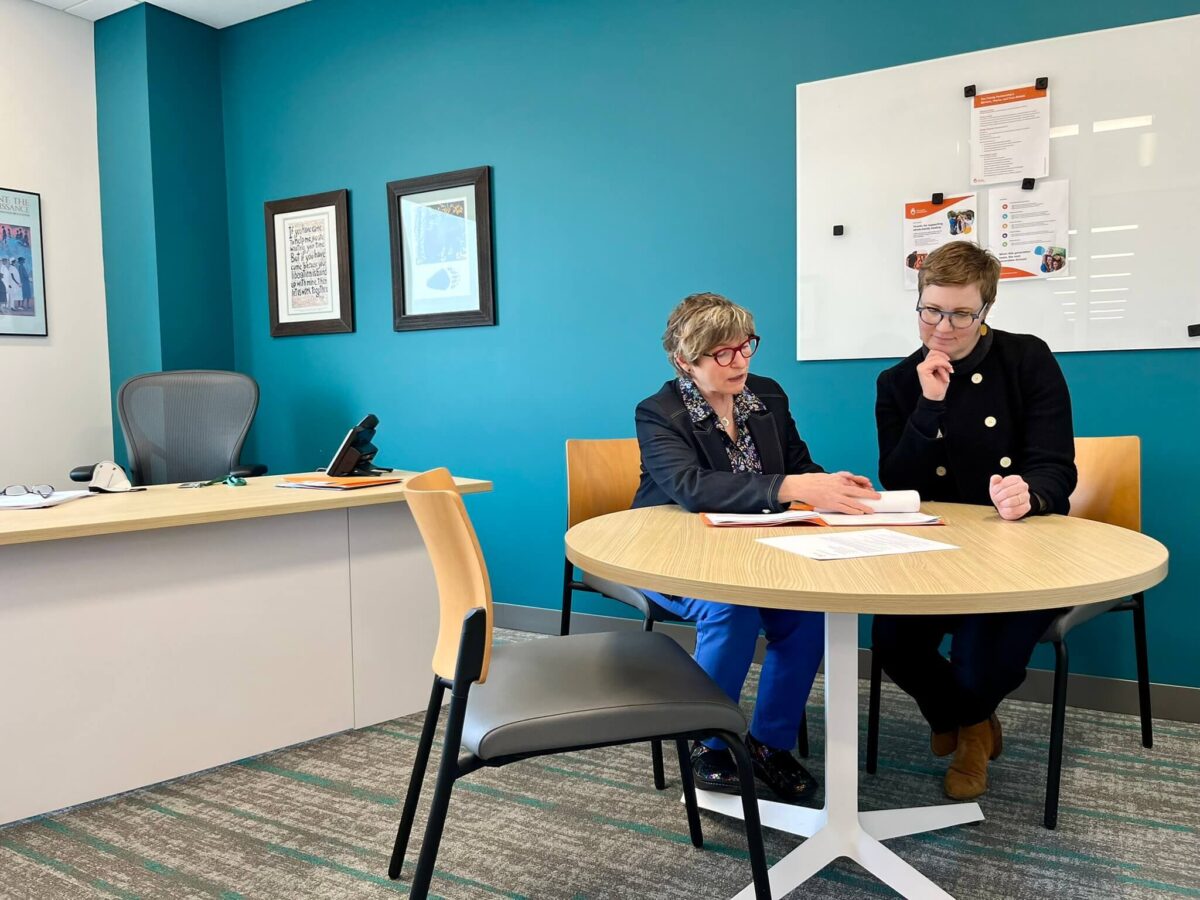
“The decision to hire Julie was made with great care and optimism for TFP’s future,” said Kit Briem, outgoing Interim President & CEO. “Julie’s leadership will provide the time and stability we need to thoughtfully select a permanent CEO who will steer TFP for years to come.”
As TFP searches for a permanent CEO, the organization is confident that Julie’s thoughtful, mission-driven approach—combined with the Bridge Strategic Framework—will position us for continued success in working to clear the path to success for children and families in Minneapolis.
Thank you for supporting generational healing in Minneapolis this year. Whether you participated in programs or donated, whether you volunteered or advocated, you are helping this generation to heal so the next generation thrives.
As Bayo Akomolafe writes, “The times are urgent: let’s slow down.” We hope this seasonal care package invites you to slow down and find moments of connection and purpose amidst the busyness of the season.
Together, we can nurture healing and hope for ourselves and future generations.
Strong Families
As part of our 2gen approach, we believe strong families form the foundation of strong communities—advancing generational healing at household and community levels.
- Make a paper window star
- Listen to a Read Along of Winter’s Gifts by Kaitlin B. Curtice, Potawatomi Nation
- Color a holiday page for Wintertime, Kwanzaa, Hanukkah, or Christmas
- Bake a winter treat: Polvorones de Canele, Sufganiyot, or Sweet Potato Pie
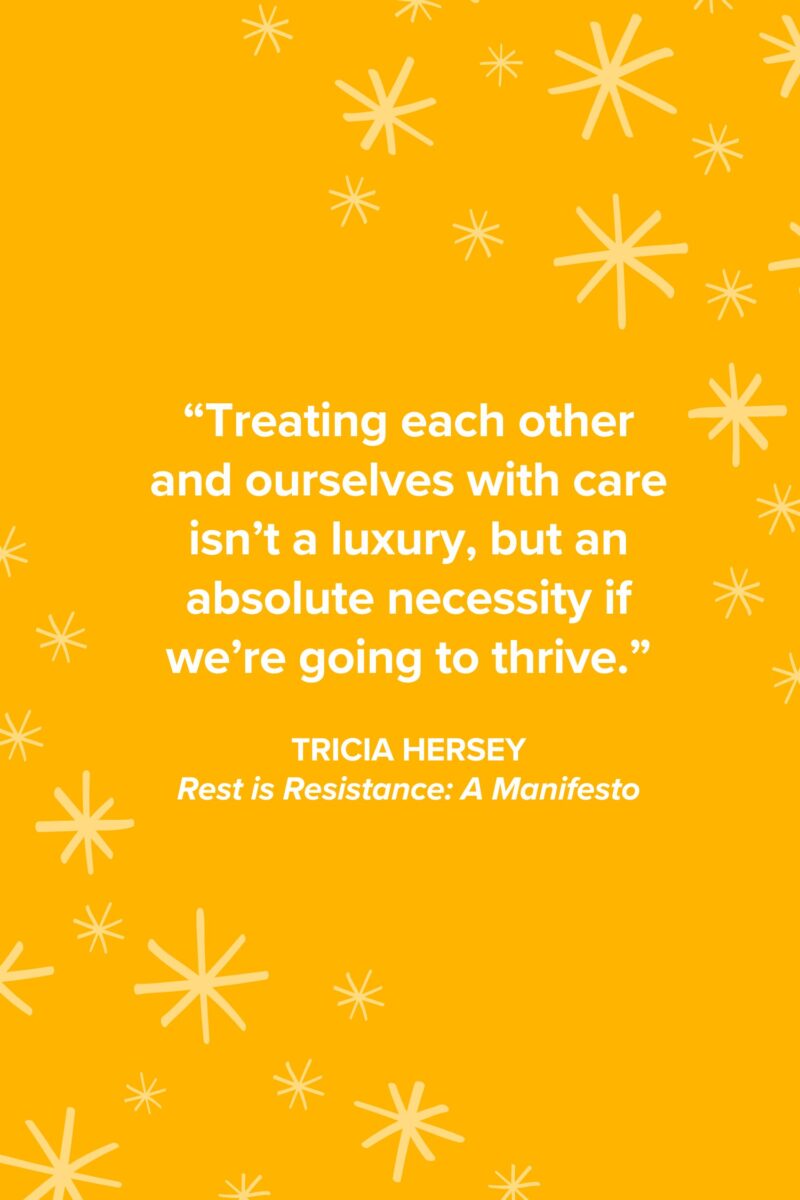
Tricia Hersey, Rest is Resistance: A Manifesto
The times are urgent. Let’s slow down.
Bayo Akomolafe
Vital Communities
Our 146-year legacy of generational healing in Minneapolis includes building partnerships that build community resources and strength.
- Listen to live jazz at Midtown Global Market on December 21 with Wenzo Ashby and guest vocalist “Tiahna”
- Visit Walker Art Center for free during First Free Saturdays
- Plan a visit to the Art Shanties from January 18 to February 9, 2025 at Bdé Umáŋ / Lake Harriet
- Attend an event at Black Youth Healing Arts Center from Irreducible Grace Foundation
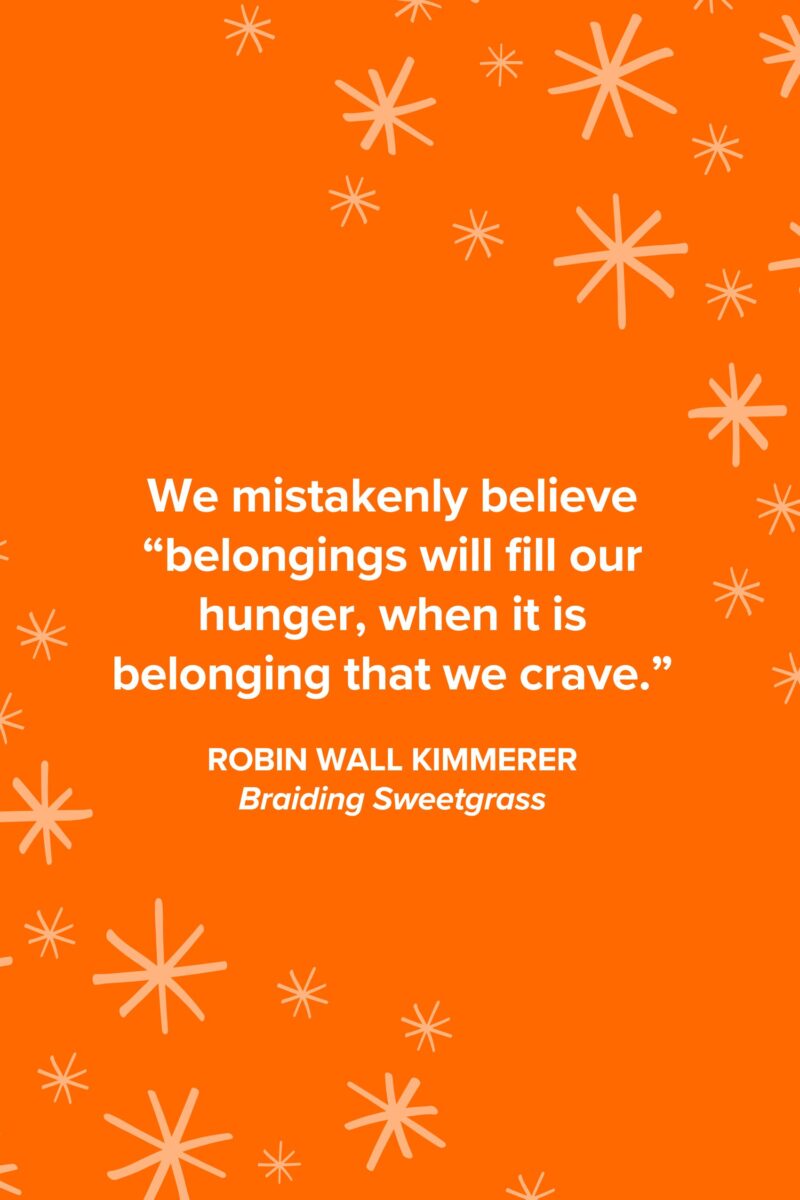
Robin Wall Kimmerer, Braiding Sweetgrass
Better Futures for Children
Strong families and vital communities support a world in which all children, regardless of income or origin, have the opportunity to thrive.
- Belly breathe together with Elmo from Sesame Street, Common, and Colbie Caillat
- Set New Years resolutions for family wellbeing using this guide from Gottman Institute
- Volunteer as a family with The Family Partnership or another organization
- Advocate for affordable childcare in Minnesota using this guide from Think Small
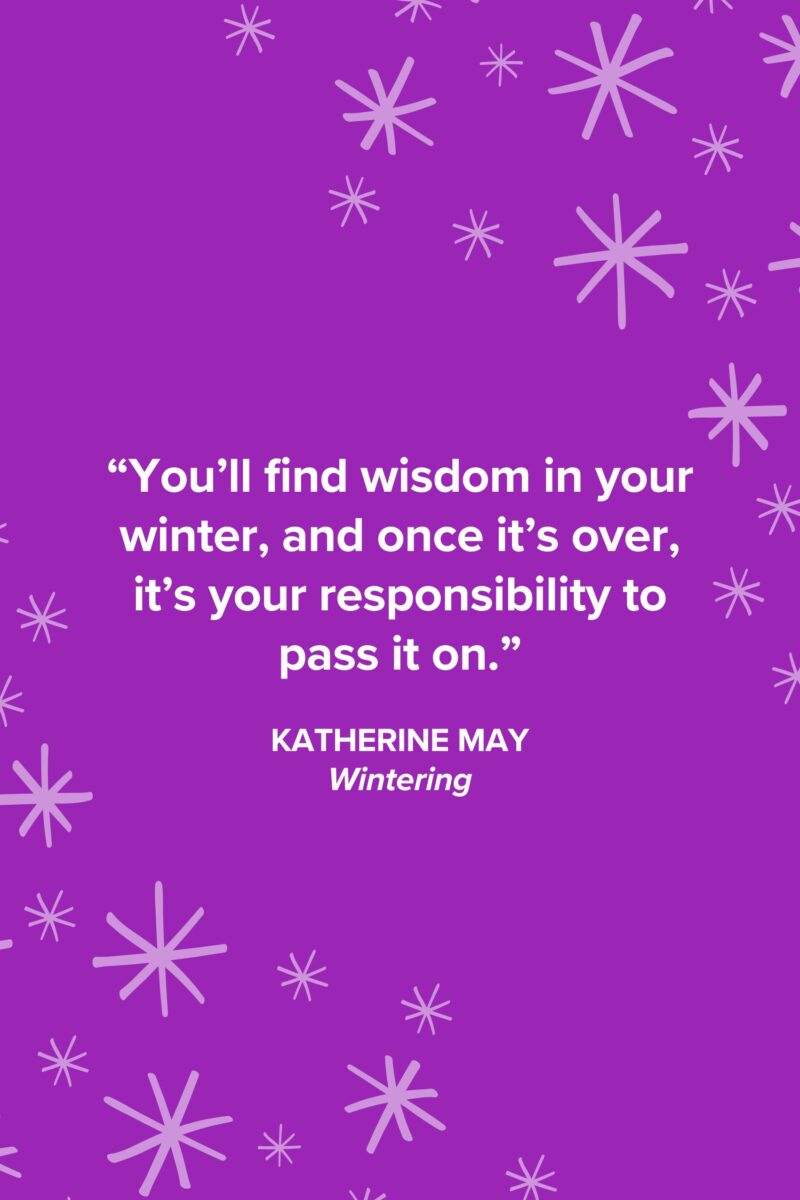
Katherine May, Wintering
Thank you for supporting generational healing in Minneapolis this year.
The Family Partnership Team
As the new Vice President of Advancement at The Family Partnership, Ashley Hemnarine brings a wealth of experience and a deep commitment to our mission: building strong families, vital communities, and better futures for children. In this article, we’re excited to share Ashley’s story, her perspective on giving, and her vision for TFP’s generational healing work with individuals and families in Minneapolis.
From Letter Writing to Leadership: Ashley’s Journey to Advancement
Ashley’s journey to The Family Partnership (TFP) is rooted in her lifelong belief in the power of solidarity. Growing up in a diverse, under-resourced neighborhood in Newark, New Jersey, she became aware early on that not everyone had equal opportunities. She noticed disparities in healthcare, where families without insurance received lower-quality care at public hospitals. She also saw her mother facing discrimination; customer service representatives often berated her because of her accent.
Even as a child, Ashley showed concern for her community. In a letter to Santa, she requested, “I want everyone to be happy, world peace, and a Barbie.” She was fortunate to attend a well-resourced school and later enroll in college—experiences that helped her understand how different her life might have been without this access.
After earning her bachelor’s degree in psychology, Ashley went on to earn her master’s in health administration. While getting her master’s degree, she saw the ways in which healthcare systems perpetuate inequities and became disillusioned with the field. However, an internship at a hospital foundation helped her see the power of fundraising to meet the needs of organizations doing important work. Seeing how fundraising supports the missions of organizations that make real and concrete differences in people’s lives inspired Ashley to move into development.
After that experience and serving as a Development Associate for a nonprofit focused on strengthening health systems in sub-Saharan Africa, Ashley came to work at The Family Partnership in 2022, first as the Development Manager, then Development Director, and now as Vice President of Advancement.
Advancing Solidarity with Minneapolis families and communities
When Ashley joined TFP, the organization’s 2Gen approach and the emphasis on generational healing resonated with her. “A lot of people I grew up with had very different lives because of where they lived and the generational trauma they had to deal with,” Ashley reflects. This perspective drives her work at The Family Partnership (TFP), where she champions equitable access to resources for all families.
The Family Partnership works in Minneapolis communities that face racial and economic disparities, in a state with some of the worst racial opportunity gaps in early childhood in the nation. While just 50% of children living in low-income households are kindergarten-ready, 100% of the children in our preschools graduate with the skills needed to succeed in school and life. When it comes to potential and promise, there is no difference between children in our preschools and their peers. The difference is access to high-quality early childhood education and care at The Family Partnership, as well as two-generation programs that support the whole family.
For 146 years, The Family Partnership has adapted to meet the changing needs of Minneapolis families and communities. A critical part of our success involves meeting people where they are at. This core value applies to participants on their healing journey, staff who bring their authentic selves to work, and donors who find their passion in making a social impact.
How Donors Support Generational Healing through The Family Partnership
Ashley is motivated every day to raise awareness and support for The Family Partnership’s generational healing work. She loves working with TFP because the organization practices what it preaches—it’s the how and the why of TFP’s work that she feels confident sharing with donors so that work can continue. “The Family Partnership truly cares about the people we serve and how we serve them. We engage people to ensure we are providing the programs they want and need.” Donors make it possible for staff at TFP to innovate and meet the goals and needs of Minneapolis families.
Ashley pointed to the example of Sofia Silva Zapatta, an outpatient mental health therapist with TFP, who noticed how stressed-out mothers were when dropping their children off for play-based therapy. Based on The Family Partnership’s two-generation approach, Sofia understood the importance of supporting parents and the role that plays in children’s mental health outcomes. In response, Sofia created a somatic yoga program that helps parents and caregivers build skills for self-regulation and stress reduction.
The program also opened doors for Sofia to build relationships with caregivers, who then opened up about their struggles. By learning more about the families’ experiences and challenges, Sofia was better able to work with children and connect families to resources. One mother in the program told Sofia, “Even though my kids have access to health insurance, I don’t have health insurance or access to mental health treatment. I never thought that getting help for me was even possible. Somatic yoga is a safe space where we can process our emotions and learn how to deal with our stress. I’m no longer alone. I’m heard…I’m seen…and me and my kids are healing!”
Individual donations to The Family Partnership are unrestricted, allowing us to be flexible and responsive to the community’s most pressing needs across all our programs. If a person can’t pay their rent one month or needs groceries, these funds allow TFP to help—after all, no one can begin a journey of healing without having their basic needs met first.
Ashley shares a few examples of other ways that donors have helped Minneapolis families:
- Mothers who experienced sexual exploitation found safe emergency housing through our anti-sex trafficking services
- Children in our preschools received essential screenings including vision, dental, and child development—removing a barrier for parents and caregivers working multiple jobs
- 152 families and 515 individuals received gifts through the holiday sponsorship
Expanding the Idea of Giving at TFP—and Beyond
In her role as Vice President of Advancement, Ashley is working to expand the idea of giving at The Family Partnership and beyond.
She says, “My superpower is being able to translate the work that nonprofits are doing in a way that helps donors execute on their passion on social issues and causes.” When she meets with a potential donor, she enjoys finding out what excites them and what they are passionate about. She believes in helping connect donors to the organizations that share their passion, even if it isn’t The Family Partnership. She said, “One nonprofit can’t do everything, so, we need to help each other out.”
My superpower is being able to translate the work that nonprofits are doing in a way that helps donors execute on their passion on social issues and causes.
Ashley Hemnarine, Vice President of Advancement
One thing TFP’s donors have in common is an understanding of and commitment to a 2Gen approach to healing.
Ashley also wants to connect with younger donors as well as black and brown donors. A report from Indiana University Lilly Family School of Philanthropy shows that there is an underutilized market of black and brown donors who are looking for organizations that serve their communities and have leadership teams that reflect them.
A report from Donors of Color Network finds, “Donors of color are generous and insightful, and because of their lived experiences, they have the potential to be a driving force behind massive change in the field of philanthropy and for equity and justice movements. Donors of color bring critical insights, resources, and talent to bear at a socio-political moment in which new ideas, investment, and innovation are more important than ever.”
Ashley said, “As a young, brown Vice President, I know that I can bring a different perspective across race, age, and geography, to connect with donors.”
To do this, Ashley believes in helping potential donors understand the needs of the community and the impact smaller gifts can have. She also emphasizes that charitable giving is not just about what someone can give financially, but also what they can give in terms of their time and expertise.
- People can donate as little as $10 per month
- Host a gathering to assemble hygiene kits for one of TFP’s programs
Donors and volunteers are especially important post-COVID, since individual giving in the U.S. has declined for the first time since 2012. In 2023, 1 out of every 5 individual donors to The Family Partnership gave less than $100. Giving time is another way to make a big difference. Last year, more than 300 volunteers generously served children and families working with The Family Partnership.
“We are living in a time when anyone can give, not just the wealthy,” Ashley said, “Everyone can give in a way that is personal and meaningful.”
Looking for a way that you can make an impact? Visit our Ways to Give page to learn more.
Guided by our mission to build strong families, vital communities, and better futures for children, The Family Partnership is announcing strategic changes to sustain our 146-year legacy of service and advocacy with families in Minneapolis.
In 2025, we will consolidate all programs at our South Minneapolis headquarters. As part of this transition, we have made the difficult decision to close our North Minneapolis building, which currently houses multiple programs including our North Minneapolis Preschool. The final day of programming for North Minneapolis Preschool will be June 13, 2025. Families with children enrolled in the preschool have already been informed by TFP staff and provided with next steps. The other North Minneapolis programs will move to our South Minneapolis location but will continue to work with the clients they currently serve.
While change is not always easy, and these were tough decisions, we are confident that this will strengthen our overall financial sustainability and focus resources where they are most impactful. By uniting our team under one roof, The Family Partnership will strengthen our position to meet the evolving needs and goals of families today and into future generations.
Please read on for a Q&A regarding this upcoming transition.
Together with our community, we are building toward a future where every family has the opportunity to thrive.
Q: Why did TFP need to make these changes?
A: The Family Partnership’s realignment is a mission-driven response to factors affecting human services nonprofits across Minnesota and the U.S. since the onset of COVID-19. Rising inflation, wage pressures, and declining philanthropic support have made it necessary to take swift and strategic action to ensure our programs are sustainable and effective.
As other organizations are reducing or closing programs, we are as dedicated as ever to helping families overcome systemic barriers to healing and well-being. Selling our North Minneapolis building is a necessary shift to reduce overhead costs and focus more resources on direct services for families. The sale will strengthen our financial position, prepares us for the next chapter of long-term planning and allows us to continue our work to serve families.
Q: How will the building sale affect families?
A: The North Minneapolis building currently houses several programs, including Behavioral Health, Family Home Visiting, and Early Childhood Education and Care. We are working diligently to find solutions and build partnerships that will keep these vital services accessible.
Early Childhood Education: The most significant impact is the closure of North Minneapolis Preschool on June 13, 2025. This decision was not made lightly. Financial realities, including increased operational costs, make it necessary to consolidate resources and focus on maintaining services in a single, financially sustainable location. We are working to minimize disruption for families by exploring options for transition to other local, high-quality programs. Our priority is to help families find alternatives that continue to support their children’s growth and education.
Behavioral Health and Family Home Visiting: Northside families will continue to access mental health, developmental therapies, and family home visiting programs as always. We are working closely with local partners to explore leasing options that will allow families who currently access in-person services to retain that option. Families will also continue to have options of hybrid and virtual services. While our staff will be relocating to our South Minneapolis office, the following programs will continue without interruption:
- Mental health therapies
- Developmental therapies for outpatient participants, as well as through our partnerships with La Creche Early Childhood Centers and PICA/Head Start programs
- Family Home Visiting including Parenting for the Future, Healthy Families America, Promising Practices, Parent Support Outreach Program and Parent Capacity-Building Program
Q: What can the public do to support TFP during this time?
A: We invite our supporters, donors and partners to stay connected and engaged with The Family Partnership. We believe in the power of our community to show up and ensure that essential human services, particularly in early childhood education, mental health, family home visiting, and anti-sex trafficking, remain strong and accessible to those facing the greatest barriers.
One powerful way to support TFP is through advocacy for increased public funding for nonprofits, which are often under-resourced despite their crucial impact. Donations, as well as active community engagement, are also invaluable in helping sustain these vital services for Minneapolis families. We encourage everyone to lend their support where it’s most needed, whether that’s through TFP or another nonprofit close to your heart.
Q: Who can I contact with questions?
A: Please feel free to contact us at communication@thefamilypartnership.org.
The Family Partnership offers play-based therapy for children, including outpatient services at our North Minneapolis and South Minneapolis locations. Play-based therapy is also available for children who attend our preschools, Four Directions and North Minneapolis Preschool, and several local PICA/Head Start locations.
What is play-based therapy?
According to Emily Geffre, Senior Director of Outpatient and Developmental Therapies, “play-based therapy provides an environment where children can explore their thoughts and emotions.” At The Family Partnership, “children get help from our therapists in special therapy rooms and in their classrooms. To a child, therapy feels just like play. But we know play is how young children explore their worlds and express themselves. This makes it a powerful tool for healing in children: it helps them to thrive and learn emotionally, physically, and socially.
There are three typical goal areas for children in play-based therapy:
- Emotional Expression: learn to be able to identify, experience and express a variety of emotions (sad, mad, happy, frustrated, disappointed, excited)
- Physical Regulation: learn ways to cope with difficult emotions and maintain regulation (breathing, positive self-talk, increasing frustration tolerance)
- Social Interactions: learn how to communicate appropriately and effectively with others (using appropriate language, compromising, following directions)
To a child, therapy feels just like play. But we know play is how young children explore their worlds and express themselves.
Emily Geffre, Sr. Director of Outpatient and Developmental Therapies
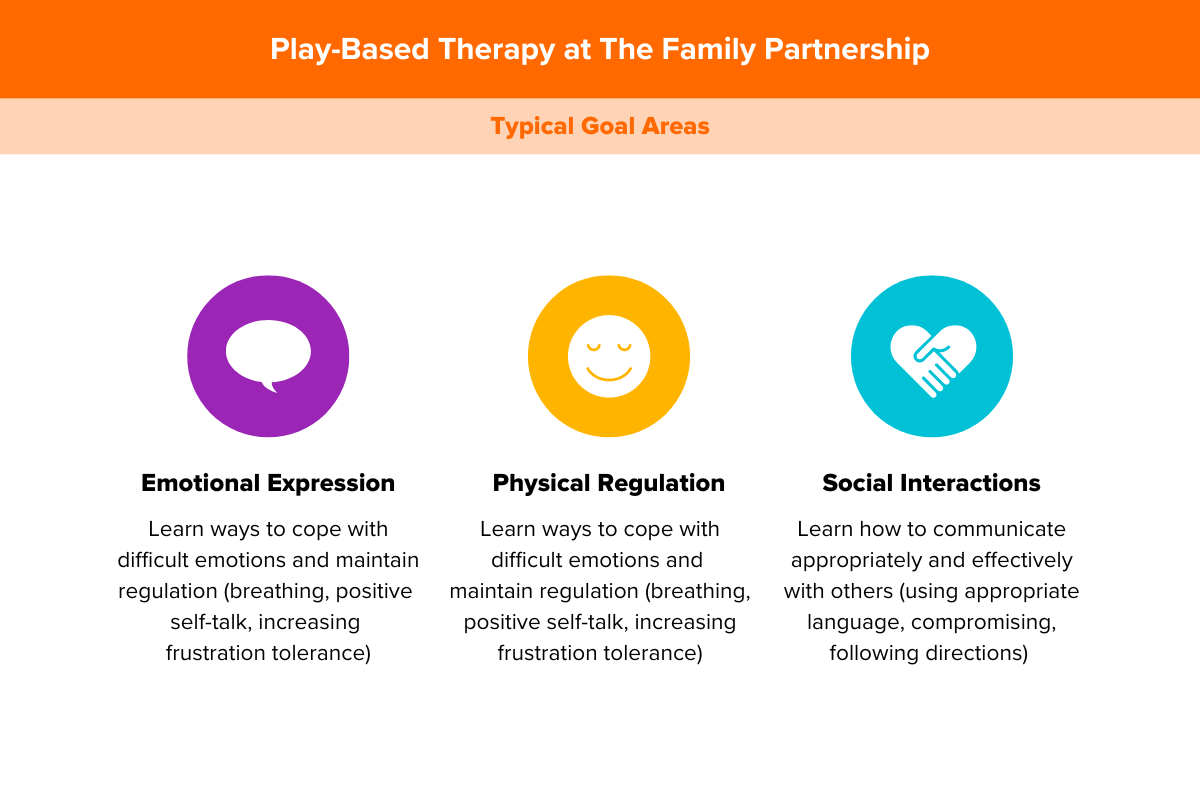
Why Play-Based Therapy Works for Young Children—and Why It’s Critical for Racial Equity
Children often lack the words to explain their feelings, especially if they’ve faced trauma or stress. This is particularly important for children of color, who experience higher rates of discipline in schools compared to their white peers—even when their behavior is similar. This discipline gap leads to missed opportunities, including learning essential skills for kindergarten, developing positive social relationships, and interacting with supportive adult role models.
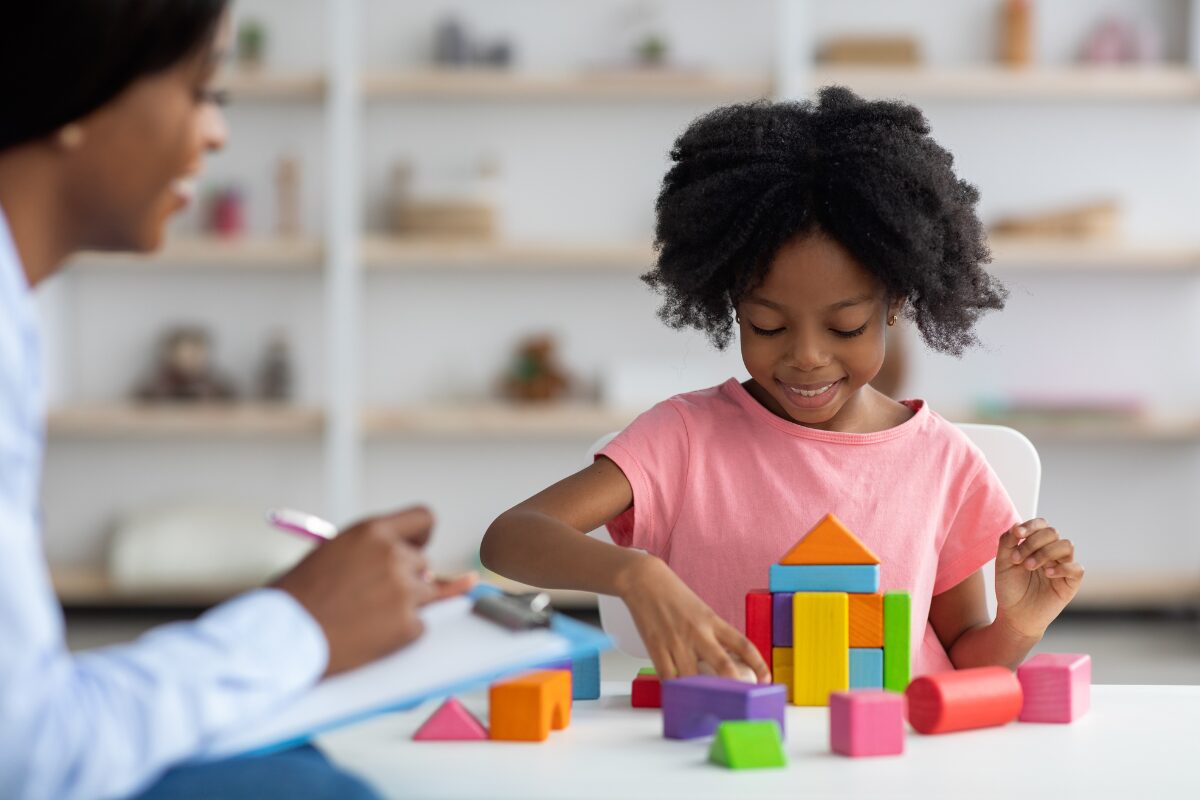
Play-based therapy supports equity in early childhood, especially for young children who have experienced trauma, systemic racism, and/or racial bias.
When children of color are disproportionately disciplined, it can reinforce feelings of instability and exclusion. By contrast, play-based therapy offers an opportunity for children to express their feelings, heal from trauma, and improve behaviors—all while receiving positive support. In fact, young children in play-based therapy often show improved classroom behaviors, making them more likely to succeed both academically and socially.
Children’s behavior often has a meaning behind it, and by providing play therapy this allows the meaning behind their behavior to come out. Play-based therapy helps children process feelings of stress and instability, creating space for them to ask for help, express worries, or simply say they need a hug. With the right tools and support, children in play therapy can build the emotional resources they need to succeed.
Early Interventions Support Better Outcomes
Early childhood is a time of rapid brain development. From birth through age five, a child’s brain is building the foundation for emotional, social, and cognitive development that continues into adulthood. Early interventions, such as play therapy, provide crucial opportunities for young children who benefit from the extra support.
Play therapy equips children with tools to manage difficult emotions and behaviors, leading to better outcomes in the classroom and beyond. By intervening early, we can help children shift their thinking from “my world isn’t safe” to “it wasn’t stable before, but now it is,” as Geffre explains.
By intervening early, we can help children shift their thinking from “my world isn’t safe” to “it wasn’t stable before, but now it is.”
Emily Geffre, Sr. Director of Outpatient and Developmental Therapies
Children learn how to express their feelings, ask for help, and communicate their needs. This early intervention leads to better long-term emotional health, improved relationships, and greater resilience in handling future challenges. By supporting children early, we prevent long-term impacts from missed developmental opportunities and set children up for success in school and life.
Supporting Families for Success Across Generations
At The Family Partnership, play-based therapy is part of our 2gen approach to support whole-family success. By engaging with caregivers, our therapists learn the unique strengths and challenges of each family. With or without trauma, Geffre says, “it’s tough when a child is acting out and it’s especially hard when one child struggles while other siblings seem fine.” Play-based therapy helps caregivers understand that their child isn’t “bad.” Instead, they’re having a hard time and need support to figure out how to move past it.
“When you have a kid who keeps acting out, dysregulated, hitting other kids, it can wear on parents,” Geffre explains. Our therapists “help parents know that it’s not that they’re a bad person or that their kid is a bad kid…they haven’t yet figured out how to integrate their experiences, and we’re going to figure out ways to help them.”
“We help parents know that it’s not that they’re a bad person or that their kid is a bad kid…they haven’t yet figured out how to integrate their experiences, and we’re going to figure out ways to help them.
Emily Geffre, Sr. Director of Outpatient and Developmental Therapies
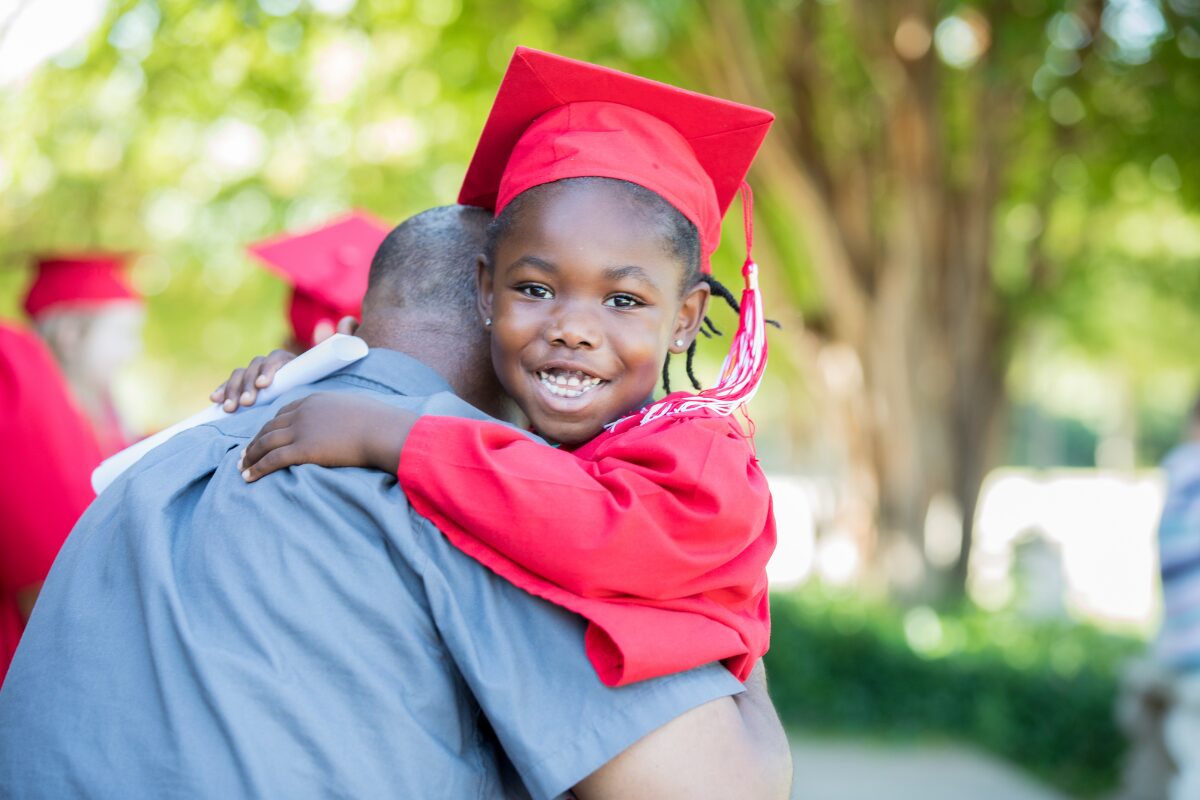
As part of The Family Partnership’s 2Gen approach, play-based therapy engages children and parents for lasting success.
Therapists at The Family Partnership work closely with caregivers to ensure they have the tools to support their children. Caregivers learn strategies to support long-term changes in their child’s behavior, ensuring that progress made in therapy is reinforced at home. Therapists also help families develop strategies they can use at home to reinforce what their child is learning in therapy.
Our therapists engage parents or caregivers by helping them understand their child’s behavior. When caregivers feel overwhelmed, therapists may offer referrals for family therapy, support groups, or services to meet basic needs. This holistic approach helps both children and parents feel more secure.
“We want parents to know, you are the expert on your child,” says Geffre. “Every child and every family is different, and we’re here to work with you to create a plan that helps your child succeed.”
Making Play Therapy Accessible and Inclusive
Preschool is a pivotal time for setting children on the path to success, especially for children of color who face opportunity gaps that begin before kindergarten. Play-based therapy is not only about addressing individual needs but also about ensuring that all children have equitable access to support that fosters their emotional and social development.
To reduce barriers to therapy, The Family Partnership brings services directly into our preschool classrooms. On-site therapy reduces the burden on families who may be struggling with financial or life stressors, and it ensures that children can access therapy faster. Our diverse team of therapists work closely with families to learn what is important to them, respecting family cultural values and incorporating them into the child’s treatment plan.
Our diverse team of therapists work closely with families to learn what is important to them, respecting family cultural values and incorporating them into the child’s treatment plan.
Geffre wants parents and caregivers to know that they can expect to find support and understanding with our therapists. “Some parents go into situations where they feel very judged, or they’re worried they are going to be judged,” explains Geffre. “The reality is, we do this work all the time. These kids are not surprising to us. In my experience, I’ve seen kids who are acting out the most are the most in need of help, and the change you see is that much greater.” By working in partnership with families, The Family Partnership helps children build the foundation for successful and healthy futures.
Interested in Play-Based Therapy at The Family Partnership?
Play-based therapy is a powerful tool for helping children heal from trauma, regulate emotions, and develop strong social skills. By offering therapy in a familiar environment like the classroom and involving families in the process, The Family Partnership meets children and parents where they’re at and supports them on their healing journeys.
Typically, we offer play-based therapy services from birth through elementary school—but older children have benefitted from play therapy as well. If your child needs support for emotional and behavioral challenges, play therapy might be the key to helping them thrive. To learn more about play therapy, contact:
Outpatient services:
English: 612-728-2061
HMOOB: 763-569-2625
info@thefamilypartnership.org
Preschools and PICA/Head Start:
Connect teachers or staff at your school.

